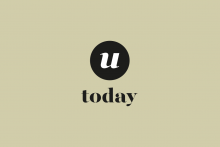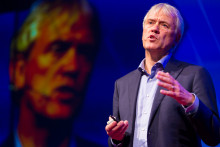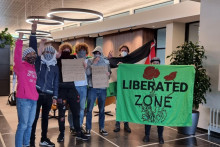As Director of the International Education Office (IEO) for the Faculty of Educational Science and Technology (EDTE), Cees van Vilsteren occupies one of the most exciting positions at the Universiteit Twente. On a weekly basis, he interacts with students from twenty-three different countries, including Libya, Kuwait, and China; on a monthly basis, he travels to the far corners of the earth - this month Bolivia, next month South Africa - in an effort to continually broaden the scope of UT international programs.
Van Vilsteren joined the UT in 1983 as part of the Department of Education Organization and Management, which was the first in any Dutch university. Four years ago he assumed the position he currently holds.
The EDTE international master programs fill a gap apparent in nearly all developing countries. As Van Vilsteren explains, 'You can find education departments all over the world, in developing countries, as well as teacher training programs, but they tend to be theoretical ('Science is theory'), which is not connected to the daily responsibilities of a teacher.' For years Program Chair Professor Tjeerd Plomp traveled extensively, identifying a need for change and assessing how to develop or redevelop study programs. Schools, universities, companies, governments all expressed interest in a program to help them to develop and support better curriculum and instructional technology. In 1994, his efforts were realized in the founding of the Master's program, Educational and Training Systems Design. Subsequently the Human Resources Development and Telematics Applications in Education and Training programs two were launched.
Each student must complete a project based on relevant topics in his or her home country. To cite a few examples, a teacher from St. Vincent plans to design and implement ideas of realistic mathematics in high school classrooms; a university employee from Sofia University in Bulgaria is developing a strategy to become more entrepreneurial, to increase collaboration between regional companies and educational institutions; and a participant from Cameroon is revising a scheme for training school principals and administrators.
There is no need to recruit participants because there is enormous international interest. Applicants learn about the program from embassies, the internet, professors, and alumni.
This year over 200 students were approved, of which only 75 were admitted due to financial constraints. Program fees range from 7,800 to 11,000 euro. In addition, students must pay daily living expenses. They need roughly 25,000 euro per year at the UT. Some students pay for themselves, others come from universities or companies that cover expenses. The World Bank or the EU sometimesoffers funding. Many students receive fellowships and grants. For example, NUFFIC offers fellowships for students from developing countries and from Indonesia. But with more Dutch universities offering International Master's programs, fewer UT candidates benefit from those fellowships.
English is mandatory because this is a highly verbal program. Students are required to give TOEFL scores, but these are not always reliable indicators. Recently the IEO staff has begun calling applicants unexpectedly to glean from a spontaneous conversation in English just how effectively they are able to communicate.
What does the future hold for EDTE Master's programs? Van Vilsteren would like to include more South American learners, but English remains an obstacle. He hopes to broaden the program to include other universities; such plans are imminent in Bulgaria and in South Africa. The IEO Director seeks to expand the PhD program. He also looks forward to increased interaction between international and Dutch Master's students as the Bachelor/Master system is implemented.
These Master's programs are examples of the success of internationalization at the UT. The IEO strives to keep students well informed starting before they set foot on campus. Bulletins in English are posted in central locations. TObias, the EDTE student association welcomes newcomers, encouraging them to join the Multi-Culti committee which promotes socializing between international and Dutch students. Other UT departments would do well to study these thriving international programs.
Kristin Zimmerman
Cees Van Vilsteren among his foreign students








